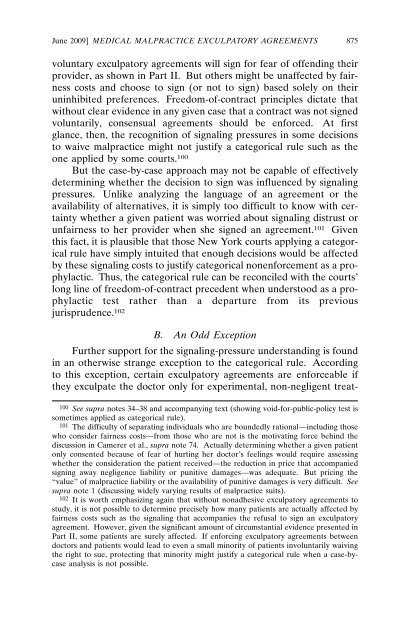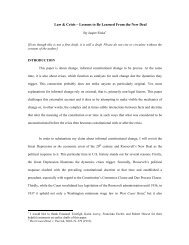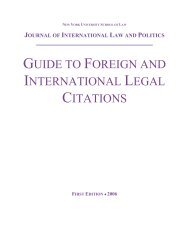In Search of an Enforceable Medical Malpractice Exculpatory
In Search of an Enforceable Medical Malpractice Exculpatory
In Search of an Enforceable Medical Malpractice Exculpatory
You also want an ePaper? Increase the reach of your titles
YUMPU automatically turns print PDFs into web optimized ePapers that Google loves.
June 2009] MEDICAL MALPRACTICE EXCULPATORY AGREEMENTS 875<br />
voluntary exculpatory agreements will sign for fear <strong>of</strong> <strong>of</strong>fending their<br />
provider, as shown in Part II. But others might be unaffected by fairness<br />
costs <strong>an</strong>d choose to sign (or not to sign) based solely on their<br />
uninhibited preferences. Freedom-<strong>of</strong>-contract principles dictate that<br />
without clear evidence in <strong>an</strong>y given case that a contract was not signed<br />
voluntarily, consensual agreements should be enforced. At first<br />
gl<strong>an</strong>ce, then, the recognition <strong>of</strong> signaling pressures in some decisions<br />
to waive malpractice might not justify a categorical rule such as the<br />
one applied by some courts. 100<br />
But the case-by-case approach may not be capable <strong>of</strong> effectively<br />
determining whether the decision to sign was influenced by signaling<br />
pressures. Unlike <strong>an</strong>alyzing the l<strong>an</strong>guage <strong>of</strong> <strong>an</strong> agreement or the<br />
availability <strong>of</strong> alternatives, it is simply too difficult to know with certainty<br />
whether a given patient was worried about signaling distrust or<br />
unfairness to her provider when she signed <strong>an</strong> agreement. 101 Given<br />
this fact, it is plausible that those New York courts applying a categorical<br />
rule have simply intuited that enough decisions would be affected<br />
by these signaling costs to justify categorical nonenforcement as a prophylactic.<br />
Thus, the categorical rule c<strong>an</strong> be reconciled with the courts’<br />
long line <strong>of</strong> freedom-<strong>of</strong>-contract precedent when understood as a prophylactic<br />
test rather th<strong>an</strong> a departure from its previous<br />
jurisprudence. 102<br />
B. An Odd Exception<br />
Further support for the signaling-pressure underst<strong>an</strong>ding is found<br />
in <strong>an</strong> otherwise str<strong>an</strong>ge exception to the categorical rule. According<br />
to this exception, certain exculpatory agreements are enforceable if<br />
they exculpate the doctor only for experimental, non-negligent treat-<br />
100 See supra notes 34–38 <strong>an</strong>d accomp<strong>an</strong>ying text (showing void-for-public-policy test is<br />
sometimes applied as categorical rule).<br />
101 The difficulty <strong>of</strong> separating individuals who are boundedly rational—including those<br />
who consider fairness costs—from those who are not is the motivating force behind the<br />
discussion in Camerer et al., supra note 74. Actually determining whether a given patient<br />
only consented because <strong>of</strong> fear <strong>of</strong> hurting her doctor’s feelings would require assessing<br />
whether the consideration the patient received—the reduction in price that accomp<strong>an</strong>ied<br />
signing away negligence liability or punitive damages—was adequate. But pricing the<br />
“value” <strong>of</strong> malpractice liability or the availability <strong>of</strong> punitive damages is very difficult. See<br />
supra note 1 (discussing widely varying results <strong>of</strong> malpractice suits).<br />
102 It is worth emphasizing again that without nonadhesive exculpatory agreements to<br />
study, it is not possible to determine precisely how m<strong>an</strong>y patients are actually affected by<br />
fairness costs such as the signaling that accomp<strong>an</strong>ies the refusal to sign <strong>an</strong> exculpatory<br />
agreement. However, given the signific<strong>an</strong>t amount <strong>of</strong> circumst<strong>an</strong>tial evidence presented in<br />
Part II, some patients are surely affected. If enforcing exculpatory agreements between<br />
doctors <strong>an</strong>d patients would lead to even a small minority <strong>of</strong> patients involuntarily waiving<br />
the right to sue, protecting that minority might justify a categorical rule when a case-bycase<br />
<strong>an</strong>alysis is not possible.
















